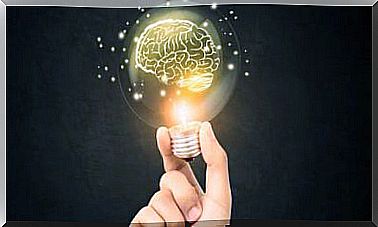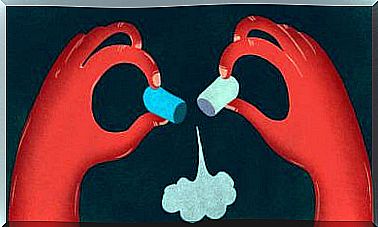Anxiety And Concentration Problems, How Are They Related?

Suddenly, the little problems of the day to day become a mountain for us. The memory fails, we forget that pending appointment, the credit card number and even that thing that we had put in the oven a while ago. Because it costs, it costs to be as productive as before at work … Why is that? Why are anxiety and concentration problems so related?
Often, we neglect (or are unaware of) the impact that this psychological state has on the brain, especially when we maintain it over time without facing it, without managing it. Thus, although it is true that memory losses and problems concentrating can have different origins, on average, dimensions such as stress, anxiety or depression are usually the most classic triggers.
However, there is a curiosity that we must know. Anxiety, by itself, has a valuable power and it is none other than to amplify our attention span. It does so so that we are able to detect risks, perceive threats and act against them. Although yes … This ability is only effective if the anxiety is punctual, if it arises at a given moment and limited in time.
In the event that this state is constant and we drag it down for weeks, months or years (in the case of generalized anxiety disorder), this is when these types of cognitive problems manifest. We analyze it below.

Anxiety and concentration problems: symptoms, causes and coping strategies
When someone suffers from anxiety, the most common thing is that they notice the physical symptoms. They are more obvious, more annoying and are usually a common reason to go to the doctor: constant headaches, digestive disorders, bad night’s rest, muscle aches … In general, a remedy for these physiological ailments is sought before the real root of the problem.
Thus, and in case of not facing this state of anxiety and its triggers, the symptoms continue to increase. Almost without realizing it, the day to day becomes harder and more difficult. Things that we solved in minutes now cost a lot more. The unforeseen, for example, are handled with great anguish … All the psychological resources that we previously had (motivation, creativity, mental agility …) begin to fail.
What is the origin? What can we do in these situations? We analyze it.
Anxiety and concentration problems, how do I know if I suffer from it?
In our society it is very common to say that “I have a lot of anxiety lately . ” We say this lightly, but not everyone takes the plunge when it comes to asking for help. It is only done when more extreme states are reached, those in which the psychological symptoms are already very pronounced. These would be some clues:
- Sensation of “mental fullness” that is, having many things in mind at the same time that give rise to a kind of haze that blurs everything.
- Problems to focus on a single thing, to pay attention to what is being done, what they tell us, what we see.
- Memory is no longer so agile, we forget small everyday things. .. For example, if we are reading a book it will be difficult for us to remember where we have left off.
- Difficulty making decisions.
- Lack of patience with people. It is difficult for us to concentrate to know what to respond, what to say or how to reach agreements.
- The things that we used to like, now we no longer do them in the same way. It’s hard to concentrate, to focus on the present moment.
- Feeling of unreality. As if what was happening was not with us.
What is the cause?
The department of psychology at the University of Pittsburgh conducted research in 2017 on this same topic. They focused on a specific type of patient: people with generalized anxiety disorder. It is precisely in these cases that anxiety and concentration problems are most evident.
To understand this, study authors such as Dr. Lauren Hallion specify the following:
- When anxiety becomes chronic, it is our emotional area who takes control. Areas such as the amygdala reduce the activity of the prefrontal areas, related to executive functions (memory, attention span, reflection, problem solving …)
- In turn, something common in generalized anxiety disorder is chronic worry. This mental state increases anxiety by intensifying the activation of the so-called fear network (made up of the dorsal anterior cingulate cortex and the amygdala).
- In this way, it is common for processes such as attention span, concentration and reflection to be reduced.

What to do if I have anxiety and it is difficult for me to maintain attention?
The person who suffers from an anxiety disorder will not see his life limited only by having problems with attention, memory and concentration. This psychological condition impacts at all levels: mind, body, emotions, quality of life, relationships … It is a state that distorts everything and makes us lose control of reality.
We know that anxiety and concentration problems are related, therefore to improve this situation the key is necessarily to treat the original trigger. The most appropriate thing is to consult with a specialized professional. Often the origin of this disorder is lifestyle, lack of coping strategies or even unresolved trauma.
Each person is a world and each mind needs particular strategies. However, on average, the following keys can help us:
- Detect irrational and non-functional thoughts, especially those that fuel discomfort.
- Rationalize emotions and leave space for them without blocking them. It is about understanding what they want to say, understanding their message to handle it much better.
- Practice deep breathing and relaxation techniques.
- Get some exercise on a day-to-day basis.
- Establish routines and leave spaces for leisure and mental rest.
- Accept that you cannot be in control of everything that surrounds you and begin to assume that life is also made up of uncertainties.
To conclude, these strategies will not give us results in a day or in a week. We need time to re-educate the brain, to change the pattern of thoughts and the pressure of emotions. However, change and improvement is always possible. With commitment and psychological therapy, advances always come.









